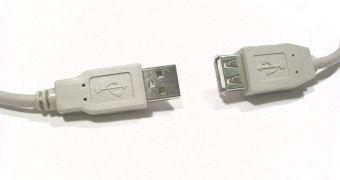Intel Corporation announced yesterday that it made available the Extensible Host Controller Interface (xHCI) draft specification revision 0.9, which comes in support to the SuperSpeed USB architecture, or the USB 3.0. The xHCI draft specification offers a standardized method for the communication between the USB 3.0 host controllers and the USB 3.0 software stack.
In order to be adopted by consumers, the SuperSpeed USB products need to offer interoperability among devices that come from multiple manufacturers. The Intel xHCI draft specification revision 0.9 provides compatibility for different implementations of USB devices, creating the conditions for an easier development of the software support for the industry.
The registers and data structures that are used at the connection between system software and the hardware are described by the specification. It also marks compatibility with the USB 3.0 specification which is being developed by the USB 3.0 Promoter Group. Intel offers the "xHCI draft specification revision 0.9 under RAND-Z (royalty free) licensing terms to all USB 3.0 Promoter Group and contributor companies that sign an xHCI contributor agreement".
The xHCI draft specification availability also announces the imminent finalization of the USB 3.0 technology, which will come with impressive performance enhancements over the current USB 2.0 standard. The bandwidth of USB 3.0 has been announced to reach 4.8 Gb/s, meaning a huge bandwidth of 600 MB/s, which is ten times the bandwidth of USB 2.0. There are some people who believe that Intel will demonstrate the USB 3.0 at IDF, which starts on August 19. Yet, only late 2009 will bring to the market commercial USB 3.0 products.
Phil Eisler, AMD corporate vice president and general manager of the Chipset Business Unit, also expressed AMD's belief in the benefits of USB 3.0. "The future of computing and consumer devices is increasingly visual and bandwidth intensive," he said. "Lifestyles filled with HD media and digital audio demand quick and universal data transfer. USB 3.0 is an answer to the future bandwidth need of the PC platform. AMD believes strongly in open industry standards, and therefore is supporting a common xHCI specification."
Other players in the industry also saluted Intel's action. "Dell welcomes the availability of Intel's xHCI specification because it provides a single interface standard that will expedite the industry transition to next-generation USB 3.0," said Rick Schuckle, client architecture strategist. "This interface standard is important to ensure that our customers have interoperable USB 3.0 systems, devices and software drivers."
Chuck Chan, Microsoft general manager of Windows Core OS talked about Microsoft's implication in the development of USB tecnologies. "Microsoft has developed driver support for the USB industry standard since its inception and is committed to supporting the latest hardware technologies on the Windows platform," Chan said. "Microsoft intends to deliver Windows support for hardware that is compliant with the xHCI specification; this is a huge step forward in enabling the industry and our customers to easily connect SuperSpeed USB devices to their PCs for exciting new functionality and usages," he added.
"NEC Electronics has supported Intel's EHCI specification for USB 2.0 and WHCI specification for Wireless USB 1.0, and developed solutions based on both of these standards," said Hiroshi Iguchi, NEC Electronics vice president of its 2nd SOC Operations Unit. "NEC Electronics will now provide USB 3.0 solutions based on Intel's xHCI specification to ensure interoperability of our solution with multiple products from various manufacturers. As we have done for USB 2.0, NEC Electronics would like to lead the USB 3.0 market with our discrete USB 3.0 host controller."
According to Intel, a revised xHCI 0.95 specification will be offered in the fourth quarter of the year. The update will be released under the RAND-Z licensing terms via an xHCI adopter's agreement as well.
Intel's announcement on the availability of the xHCI draft specification and the fact that industry leading companies expressed their approval indicate that a step forward has been made. Few weeks ago, some of the big players in the industry were not too happy with Intel not willing to disclose information on the USB 3.0 technology "until it is mature enough". Both AMD and Nvidia are said to have signed the USB 3.0 agreement.

 14 DAY TRIAL //
14 DAY TRIAL //